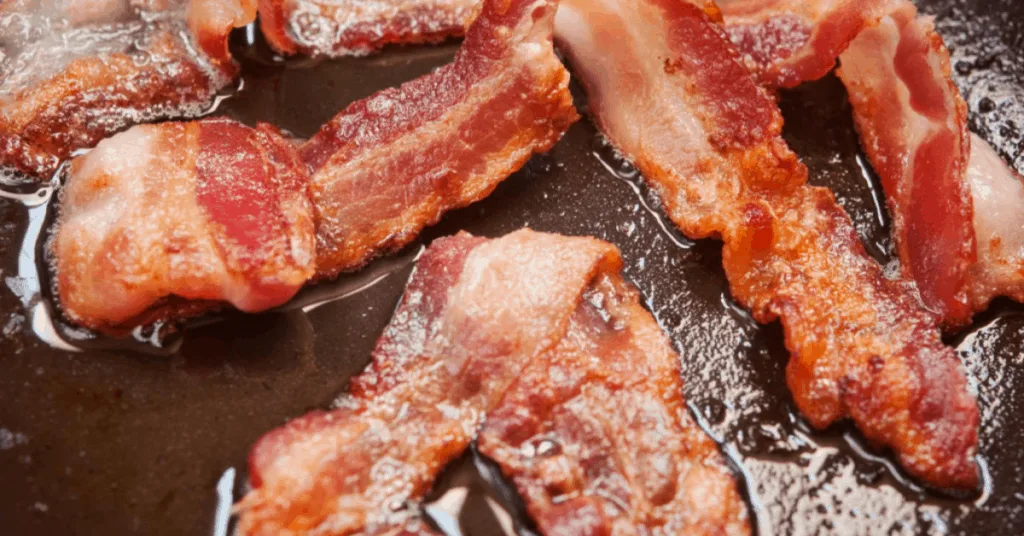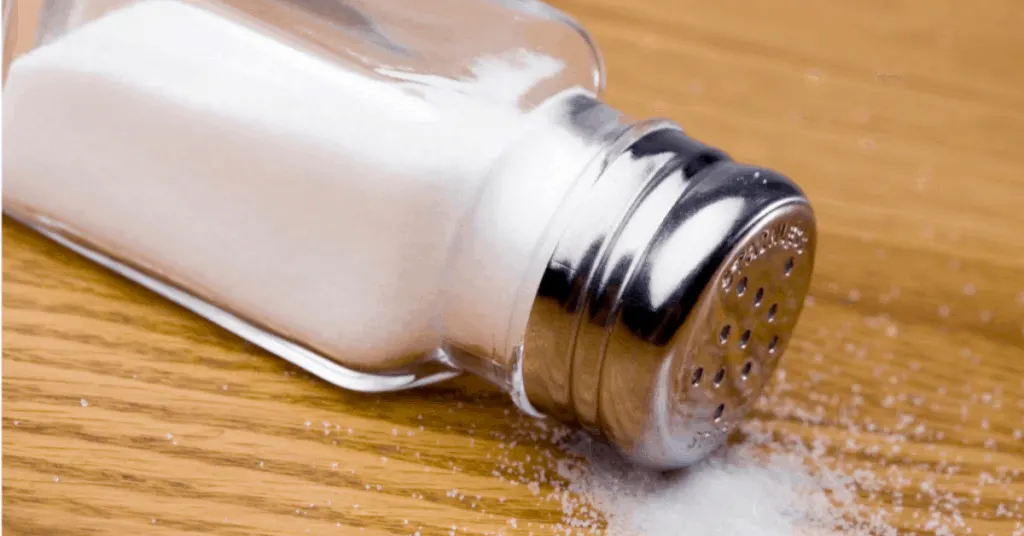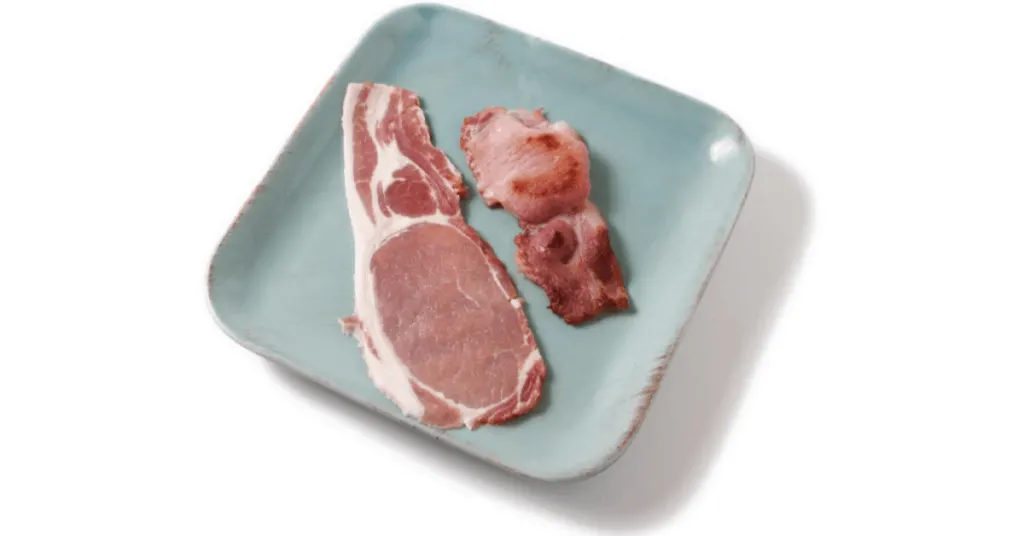
Many dog owners assume that just because dogs are carnivorous, it is perfectly okay to feed them bacon. But is it really – can German Shepherds safely eat bacon?
Bacon, when fed in moderation, is generally safe (and delicious) for dogs to eat. It is easily palatable and appeals to a dog’s carnivorous taste buds. Bacon also contains fat and protein – two essential nutrients in a dog’s diet.
Here in America, where there is without question a bacon addiction, we sometimes transfer our own bacon-y desires onto our dogs. This is for good reason – after all, bacon is delicious!
In this article we will discuss whether bacon is safe for your German Shepherd to eat, how it affects your dog’s digestive system, how often you should feed it, and also offer a suggestion or two about healthier alternatives for a yummy treat.
Click Here to Jump to a Section
How Often Can I Feed Bacon to My German Shepherd?
Although safe for your GSD to eat, pork bacon is best given in moderation. Give it your GSD as an occasional yummy treat or crumbled up as a topping on your dog’s food.
We do not recommend that you feed your dog more than about 2 strips of bacon per week. Any more than this may be unhealthy for your GSD, and can also potentially turn into your dog becoming a beggar for bacon!
While this may sound cute, trust us, it’s not!
By feeding your GSD too much bacon, you run the risk of potentially “spoiling” your dog and may result in her shunning her regular food and insisting on bacon instead.
Fat Content in Bacon
Bacon typically comes from the fattier parts of a pig such as the belly or less fatty cuts from the back. Over 60% of the calories in bacon come from fat, half of which is saturated.
Saturated fats are found in items such as bacon grease, fatty beef and pork, chicken skin, coconut oil, butter, cheese, and whole milk.
While saturated fats get a bad rap, contrary to popular belief, they are not as “evil” as many of us believe them to be. We do, however, recommended that you give them to your GSD only in moderation.
In humans, it is generally recommended by health experts to replace saturated fat with “good fats” coming from fish, vegetables, nuts, and seeds to reduce the risk of heart diseases and stroke.
Like humans, dogs need fat in their diet for the following reasons:
- Fat is a main fuel source for dogs.
- It helps the body absorb essential vitamins and minerals.
- It helps release hormone-like substances that prevent inflammation.
- It keeps your dog’s bones healthy.
- It helps your dog’s skin become healthy and his fur shiny.
- It makes the food taste palatable.
A dog requires 10-15% of his diet to be in for form of fat in order to maintain optimal health. German Shepherds are generally large dogs, so they need more protein and fat than their smaller counterparts.
Active and growing GSD puppies require food that contains about 8% to 12% fat. Like humans, problems will occur if your GSD consumes too little or too much fat.
For a thick-coat breed like the GSD, too little fat consumed can cause skin problems and a dull coat.
On the other hand, too much fat will cause your GSD to become overweight, which may result in health problems such as heart disease or pancreatitis.
Since large breeds like GSDs are also prone to arthritis and hip problems, the extra weight can aggravate these conditions.
Sodium (Salt) Content in Bacon

Sodium is an important mineral that ensures that your dog’s cells contain a balanced amount of electrolytes. It also aids in muscle growth and contributes to nerve health.
Too little sodium intake can cause conditions such as low blood pressure, restlessness, skin and hair problems, fatigue, and exhaustion.
The recommended sodium intake for an adult male dog is 13 mg per kilogram of body weight in a day. Hence, it is safe for an adult GSD weighing 30 kilograms (about 66 pounds) to consume 390 mg of salt in a day.
A cooked slice of bacon contains about 137 mg of salt, so a large GSD can safely consume the occasional slice of bacon.
Even though a GSD can consume more sodium that that contained in 1 slice of bacon, remember that 390 mg is the maximum suggested daily intake.
Dog food also contains sodium, so you do not want to fulfill your GSD’s entire daily intake by feeding her too much bacon at one time.
How Does Salt Taste to a Dog?
While it is an important component of a dog’s diet, salt does not contribute to food palatability for dogs.
Granted, dogs have taste buds like humans do (although not as many), but since their diet in the wild is composed mainly of meat which is high in sodium, their taste buds have not evolved in the same way.
This means that dogs do not crave salt the way humans do. Therefore, it is highly unlikely that dogs love bacon due to its added salt content.
What If My German Shepherd Eats Too Much Salt?
While dogs can generally tolerate high sodium in their diet, provided that they have free access to fresh water, please do not use this as an excuse to feed excess sodium to your GSD.
High amounts of sodium can cause health problems in your GSD just as much as a lack of it does.
Excessive sodium in consumed food can cause your GSD to become thirsty and drink lots of water, leading to frequent urination or even “bloat.”
Bloat can be quite dangerous, especially since large dogs with deep chests like GSDs are prone to this condition.
Also known as gastric dilatation-volvulus, bloat happens when a dog’s stomach expands due to excess food or gas, preventing blood from the hind legs from reaching the heart.
The overstretching also causes pressure on the other organs, causing damage.
In rare cases, toxic levels of salt can lead to salt poisoning, or sodium ion intoxication. This is a potentially life-threatening condition that can cause vomiting, diarrhea, restlessness, seizures, and even death if left untreated.
Pro Tip
Make sure that you do not feed your dog bacon just before you leave her alone in the house.
Consuming bacon will increase your dog’s thirst, and therefore cause her to drink more water than usual, which will lead to increased urination.
Even if you have no concerns about your GSD having an accident in your home, it is uncomfortable and unhealthy for your GSD to hold in the desire to urinate.
Part of the cycle of urination is to help your dog flush out bacteria and other toxins that build up in the bladder, urethra, and kidneys.
Holding urine in prevents these bacteria and toxins from exiting your GSDs urinary system, and can lead to urinary tract infections.
Should You Give Your German Shepherd Cooked or Uncooked Bacon?

There is still much ongoing debate among dog owners and experts on whether it is safe to feed a dog raw meat.
While dog lovers are still pretty divided on this topic, the American Kennel Club does not recommend feeding your dog raw pork, as it can cause a parasite infection called trichinosis, from the trichinella parasite.
Although this infection affects humans more commonly than dogs, it can still cause unpleasant symptoms such as an upset stomach, vomiting, lethargy, fever, pain, and inflammation.
Due to the number of preservatives added and the possibility of parasite infection, it is safer to feed your GSD cooked bacon.
For a more detailed look into whether or not you should feed your German Shepherd raw meat, we have an excellent article for you right here.
Healthier Alternatives to Bacon for Your German Shepherd
There are a number of healthier foods that you can give your GSD that are just as yummy as bacon.
Since GSDs require a lot of protein in their diet (about 22%), meat is an essential part of it.
Baked or boiled chicken (unseasoned and unsalted) is preferred as it provides enough protein, fat, vitamins, and minerals.
Meat from other birds will also suffice. Just make sure not to give your GSD cooked bones to prevent splintering in the throat or stomach.
Fish, like salmon, are also a great source of protein and omega-3 fatty acids. Just remember to serve it cooked, as raw fish contains salmonella.
Healthier and safer treats for your GSD are fruits like bananas, berries, apples (without the seeds), mangoes, melons, pineapples, and watermelons (without the seeds).
Avoid avocados, grapes and raisins, persimmons, and plums at all costs. These fruits contain toxins that can cause a host of health issues, and even death.
Vegetable treats include carrots, cooked broccoli, green beans, and cooked sweet potatoes. Avoid garlic, onions, leeks, and chives.
Nuts, peanuts, pecans, and cashews are generally safe for dogs, but should be given in moderation due to their fat content.
Almonds and pistachios can be choking hazards due to their size, so avoid them if you can. Never give macadamia nuts, because they are toxic for dogs.
Other delicious treats are cheese (in moderation), yogurt, milk, peanut butter, and unsalted popcorn.
For a more comprehensive list items to never feed to your GSD, make sure you check out this excellent article that I’ve written for you right here.
Is Turkey Bacon Healthier Than Pig Bacon for Your German Shepherd?
We certainly understand how tempting it can be to give in to your GSD’s adoring, begging eyes.
However, we urge you to exercise restraint when it comes to feeding bacon to your dog for all of the reasons that we have mentioned.
Luckily, there is a much healthier alternative, and your GSD will not notice the difference. Enter turkey bacon!
Turkey bacon is also packed with protein but contains less fat than pork bacon. The texture is similar to that of pork bacon, and your GSD will find the smell of it cooking just as intoxicating.
However, be sure to opt for uncured turkey bacon, and make sure that you cook it without salt or seasoning before serving it to your GSD.
We still urge you to be mindful here. Turkey bacon still contains lots of additives, so it is best to feed it to your GSD in moderation.
Just like pork bacon, serve serve turkey bacon as a treat or a finely chopped topping on your dog’s food.
This will increase flavor, but be mindful of doing this no more than one time per week.
As we’ve discussed above, it is important that you avoid doing this too often, as it may cause your GSD to neglect her regular food.
Can I Feed Fake Bacon Bits to My German Shepherd?
It’s one thing to cook some bacon and chop it up to put on your GSD’s food every once in a while, but do not feed artificial bacon bits to your dog. There is simply no good reason to do so.
Artificial bacon bits are highly processed, and even though the nutritional labels will seem relatively harmless, there is simply no benefit to be had for your dog.
Because they are so highly processed, fake bacon bits will simply pass through your dog’s digestive system without conferring any tangible health benefits to her.
Artificial bacon bits also contain so little protein in comparison to real pork or turkey bacon, that it is hardly worth mentioning. At best, fake bacon bits contain 1/10 the amount of protein as the real thing.
Bacon Flavored Treats
There are a number of bacon flavored dog treats on the market, and my German Shepherds have had their fill over the years.
While my dogs have never turned down a bacon flavored treat, they do have their preferences.
I’ve had good luck feeding my dogs Blue Buffalo Sizzlers Natural Bacon flavored treats.
These treats begin with pork as the first and primary ingredient, and they are free from wheat, corn, and soy.
They also do not contain any artificial preservatives such as BHA or colors like red dye 40, which, if you look carefully at dog treat labels, you will find that it is contained in many different brands.
Final Thoughts
Bacon is a favorite among humans and dogs alike. But remember that its irresistible flavor is the result of a combination of high amounts of fat, salt, and other preservatives.
These flavorful components are simply not the best things to be feeding to your GSD in any large amounts.
On the other hand, bacon is packed with protein and fats that are essential in a big dog’s diet.
The takeaway – moderation is key. Your German Shepherd can enjoy bacon just as much as you do, just not every day.
Also, make sure that you do not feed bacon to your GSD right before you leave her alone in the house.
Lastly, remember that other tasty treats, such as plain chicken, fruits, cooked veggies, nuts, cheese, turkey bacon, and bacon flavored treats can supplement your GSD’s occasional treat menu.
